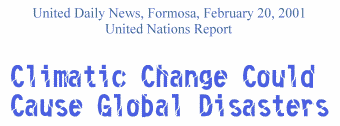|
Media
Report
|

[Edited by Li Ming-chu / compiled from wire service reports, February 19] The United Nations Intergovernmental Panel on Climate Change presented its latest report on the Geneva conference today, stating that the ice caps in the North and South Poles will continue to melt and other climatic changes will occur over the next several centuries. The Earth's tropical islands and snow-covered Alpine skiing retreats may not be around for future generations to enjoy.
According to the report, global warming will lead to increased agricultural yield in the northern region of the temperate zone, but will be detrimental to farms in the tropical zone. This will further widen the gap between the rich in the prosperous industrial countries and poor in developing nations.
The report said that poor countries in Africa, Asia, and Latin America will bear the brunt of the devastating effect of global warming, but the wealthier countries will not be immune either. In the United States, Florida and other areas along the Atlantic coast are most likely to be lashed by storms and endangered by the rising sea level. In the 21st century, climate changes may lead to large-scale and possibly irreversible changes to the Earth that will subsequently cause disasters worldwide.
This report, an incisive review on climate changes published for the first time in five years, is a nineteen-page summary of a thousand-page research report entitled "Climate Change 2001: Impacts, Adaptation and Vulnerability", conducted by some seven hundred scientists. Given the political sensitivities of the climate debate, the summary was subject to a weeklong discussion by experts and government representatives from many countries prior to release, and was finalized only yesterday.
The experts on the panel have reached this alarming conclusion: Human-accountable climate change will lead to more "freak" weather conditions such as cyclones, floods, and droughts; massive displacement of populations in the most severely affected areas; potentially enormous loss of human life; greater risk of diseases such as malaria as the habitat for mosquitoes expands; and extinction of species such as the Bengal tiger, as their habitat is destroyed.
The report predicted that crop yields in Africa will be reduced, water sources will diminish, and desertification will become more severe due to decreased annual rainfall, especially in South, North, and West Africa. Hot weather, floods and droughts in the barren and tropical regions of Asia may hurt food production. In the coastal lowlands of the temperate and tropical zones, massive population displacements will occur due to rising sea levels and land shrinkage.
Southern Europe is likely to become vulnerable to drought, while other regions on the continent may have more frequent floods . It is predicted that half of the Alpine glaciers could disappear by the end of this century; droughts and floods will occur more frequently in Latin America; vital crop yields will be reduced in many places; malaria and dengue fever will spread in North America; and climate changes in the polar regions will be the most extreme of the whole planet.
*Master's Words *Selected Questions & Answers *Pearls of Wisdom *Master Says *Spiritual Cultivation and Daily Life
|
eNews
Subscribe Magazine Online |
|
News
No. 123
Contents |